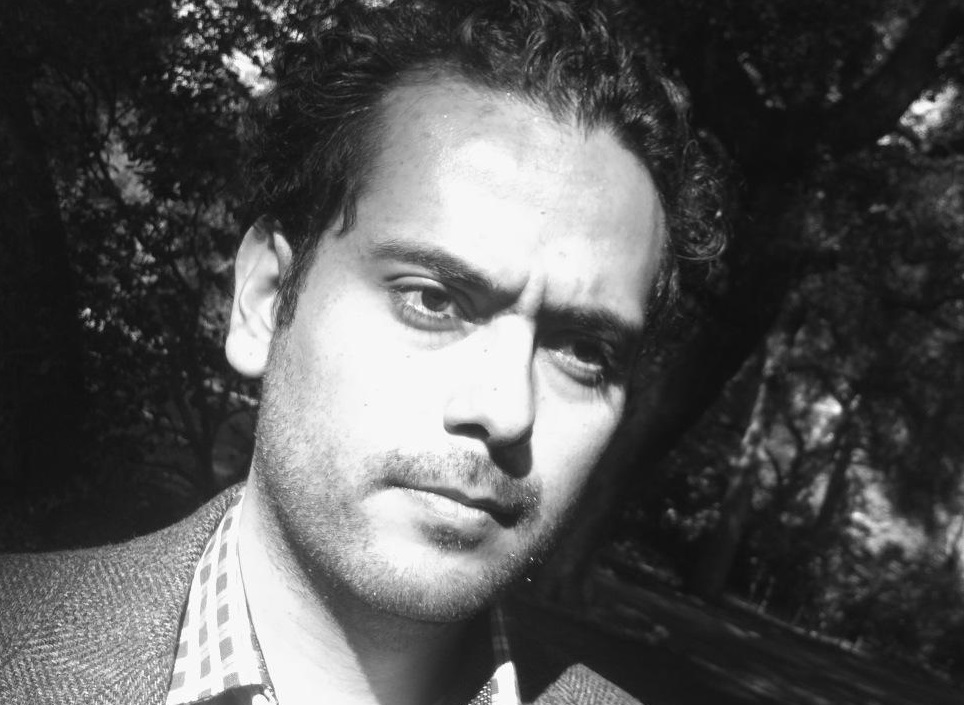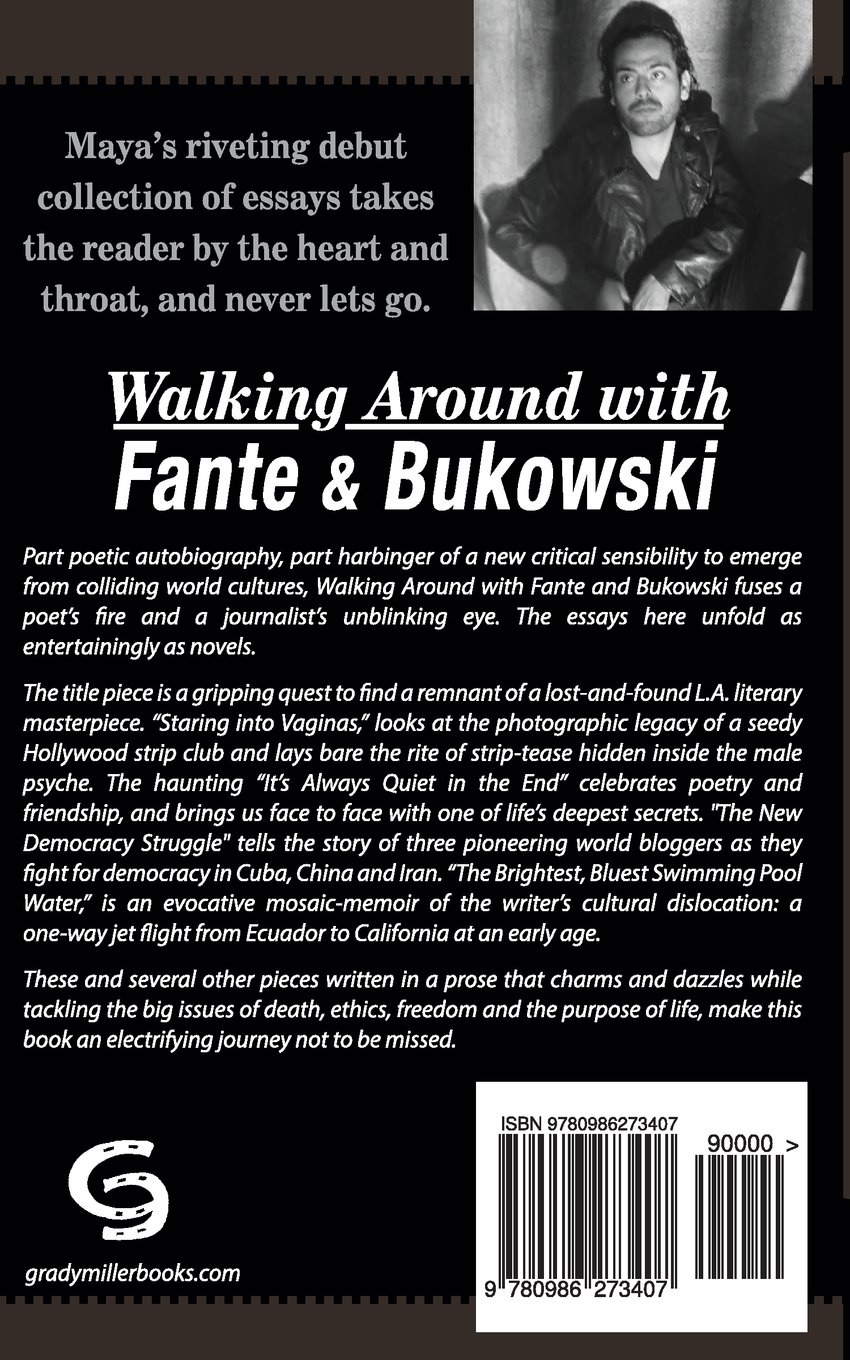Walking Around with Fante and Bukowski: art, sex, politics and the ups and downs of cultural displacement is the first book by LA based journalist Patricio Maya. It compiles several short essays on the aforementioned topics and biographical narrations. Entre Noticias interviewed Mr. Maya about his work, that can be purchased in Amazon.
By H. Espinoza.
When he was in Ecuador, the author thought of the United States as this dreamy land where the roads are wide and open for the young and free minded people. Having moved to California at the age of 12, now he reminisces South America as the oneiric scenario where his earliest concepts of life originated.
This cultural displacement becomes the guiding light that allows Patricio Maya to explore the endemic struggle of a young immigrant: finding out what is your place in the world.
From childhood memories, extensive literature remarks and interviews with renowned artists and personalities (including our own Rubén Luengas), Mr. Maya doesn’t just contemplate or describe facts. He takes a stance on every topic, being this both risky (when rushing for a final statement in very complex issues) and also the merit of his work, because we are certainly living a world full of cultural displacements, moral relativism and self-centered individuals. This makes Mr. Maya’s book an earnest attempt to define his role in a confusing world. Being genuine and authentic is the first step for good literature.
Entre Noticias: How did the idea of a series of essays come up?
Patricio Maya: I had written a few essays about photography and performance art for Drkrm gallery and other venues. So the original idea was to collect my art writing, but putting the book together it became clear that the collection should have a wider scope. Some pieces were hybrids between auto biography and cultural writing, narrative and criticism. It was like a puzzle. The idea that the collection would be a sort of coming of age story through art and politics emerged at some point during the process. Then it was about fine-tuning. The book’s editor, Grady Miller, helped a great deal. He translated the tittle piece from the Spanish, convinced me not to discard the essay on Roberto Arlt’s novel “Mad Toy,” and sharpened the prologue with really pointed suggestions.
Among the wide range of writers mentioned in the book, obviously Fante and Bukowski stand out. What makes you identify with them?
I identify with their relationship to Los Angeles as a physical and architectural space inhabited by pedestrians. A line in a song by The Smiths comes mind, “When you walk without ease on these streets where you were raised.” In Fante’s “Ask the Dust” and in Bukowski’s stories and poems I found a very real relationship to the streets where I was raised. It was important that in their fiction both authors mention street names and other physical locations. For instance, Bukowski describes his experience having spent hours reading at the Central Library in Los Angeles while being surrounded by the homeless people who take refuge there. Fante writes about taking the subway from downtown L.A. to Long Beach. Two key experiences for me as teenager were public space in the city and reading lots of books. When I was brought to California a month before turning 13, I went from living in a small villa on the outskirts of Quito, to living in a small apartment overlooking L.A.’s Chinatown. Within a couple of days my life literally went from green pastures to elevators, subways and freeways. It was a shock, to say the least. I got into books and music. At first I read a lot of big Latin American writers like Neruda, Borges, and García Marquez. They spoke to me about who I was (or had been) but not about where I was (and who I was becoming). Fante and Bukowski spoke to me about that. The first writer I read in that vein was William Saroyan, then came Bukowski and then Fante. The three are first generation Americans who lived and worked in California.
Why did you decide to interview Rubén Luengas?
There were lots of things I wanted to say about immigration in the United States. I wanted to take a clear stance on record and contribute to the debate. I felt like I had a personal story but did not want to make the piece about myself. I wanted it to be about issues and arguments. At the time Rubén was doing daily local news for Telemundo 52. I liked his relaxed style and agreed with his views on immigration, but had not thought about doing the interview yet. Then I saw him at a big immigration march. The Los Angeles mayor at the time, Antonio Villaraigosa, was speaking from a stage, but I did not find him engaging. Rubén, on the other hand, was at ground level, talking to the people — I saw that he had a way with words and lots of knowledge. So I called him up and we did a profile and an interview for AND Magazine. Let’s just say the interview was a hit. Not only were there lots of people engaged online, including conservatives, but he made a great argument for immigration reform taking history into account. Deferring to someone who could do a better job at taking apart the immigration issue was the right thing to do at the time. It was also educational on a personal level.
You hold a Masters degree in Journalism. What do you think of today’s mass media and the work conditions of the communications professionals?
Three things.
One: people and companies expect you to work for free. Everyone from the Huffington Post to small print magazines rely on unpaid content generators. There’s also another way in which employers sidestep the payment responsibility: they pay per click on ads. This means you post an article and get money for the ad earnings the article generates (usually not much). So in that sense the current working conditions are difficult. Being a young journalist today is almost like being an actor. You need a side job as a waiter or as a Lyft driver while you wait for something decent. I don’t blame those who, as one friend put it, go to the dark side. The dark side being public relations or (gasp!) advertising. I have been both a Lyft driver and an ESL teacher, but haven’t ruled out the dark side yet.
Two: the media is so overcrowded that it’s hard to make yourself get heard, unless you write for a super big online platform. Let’s say you risk your life interviewing an ISIS member and post that interview on Facebook. Theoretically, that interview would get the same space on “the wall” as somebody who is linking to a photo of Justin Bieber making out with Selena Gomez. It’s just the way things are today.
Three: this may sound like a contradiction after what I just said, but I believe these are great times for journalism as a tool for inquiry and revelation of uncomfortable truths. The internet is overcrowded, it’s hard to get heard, and even harder to earn a living, but the tools are free, and there are people who make it. Take blogging and micro-blogging for instance. Citizen-journalists in the most repressive and far-flung regimes are using blogs to fight for freedom and democracy as we speak. Of course, autocratic governments are trying to keep up by regulating the internet and shutting down dissenting blogs. The same is true in the United States, but on a different scale. It’s all sort of baffling and fascinating. Just picture this: the same Silicon Valley technologies that brought us Perez Hilton have brought us Yoani Sánchez and Hossein Derakhshan.
What are your next plans? Are you preparing a novel?
I’ve been working on one, but I’m not a fast writer. Not only do a type with two fingers, but also edit obsessively and change my mind often. What seems great one day seems terrible the next. That said, I’m having a lot of fun with the novel. Reading “The Fuck Up” and “Chinese Takeout,” by Arthur Nersesian, one of my favorite contemporary writers, has taught me to have fun with fiction. When you read Nersesian’s work, you get a sense that he probably laughs out loud as he writes. I think I’m getting there (the people at the library must think I’m nuts, but it’s liberating). It starts with writing about stuff you enjoy and not only about stuff you think you should enjoy. In my case, I’m into stuff like world soccer, crass Hollywood comedies, indie music, and fashion photography. Being into popular culture does not mean you don’t care about existential or deeply political stuff. In fact, like Slovenian philosopher Slavoj Zizek has shown, you can fuse both worlds with great results — if you do it right. That’s where I’m at with the novel. Part of it is about an ad campaign character most people are familiar with. The other parts I’m still trying to figure out.
Back cover image:









